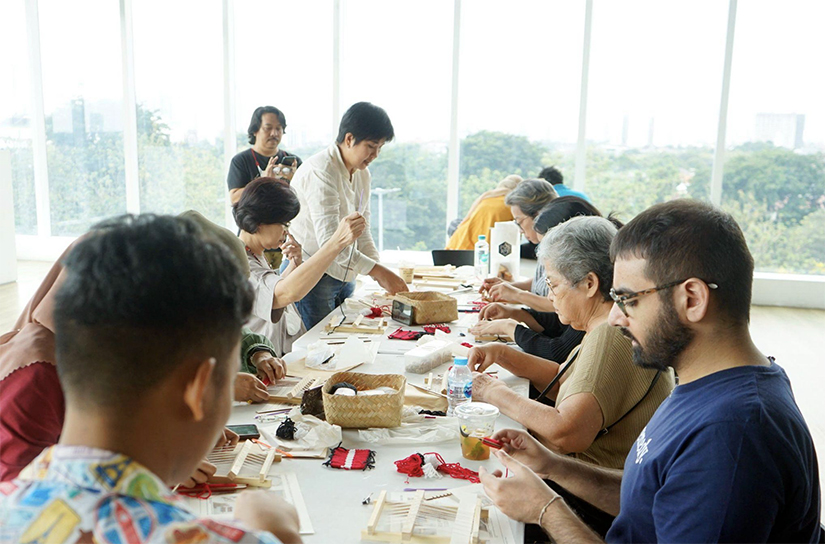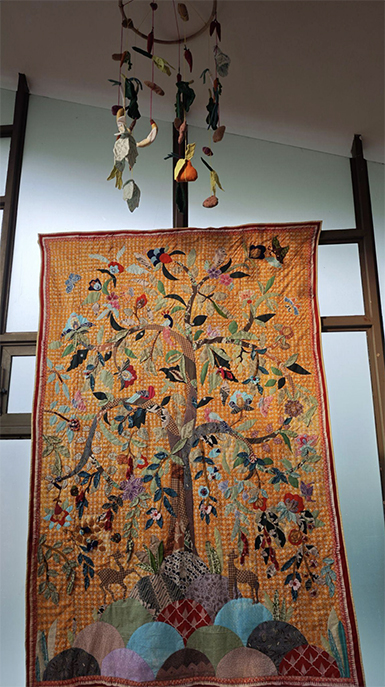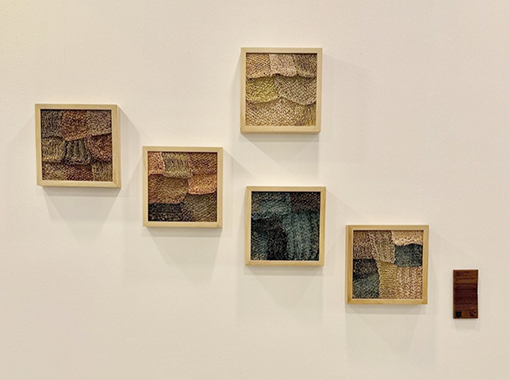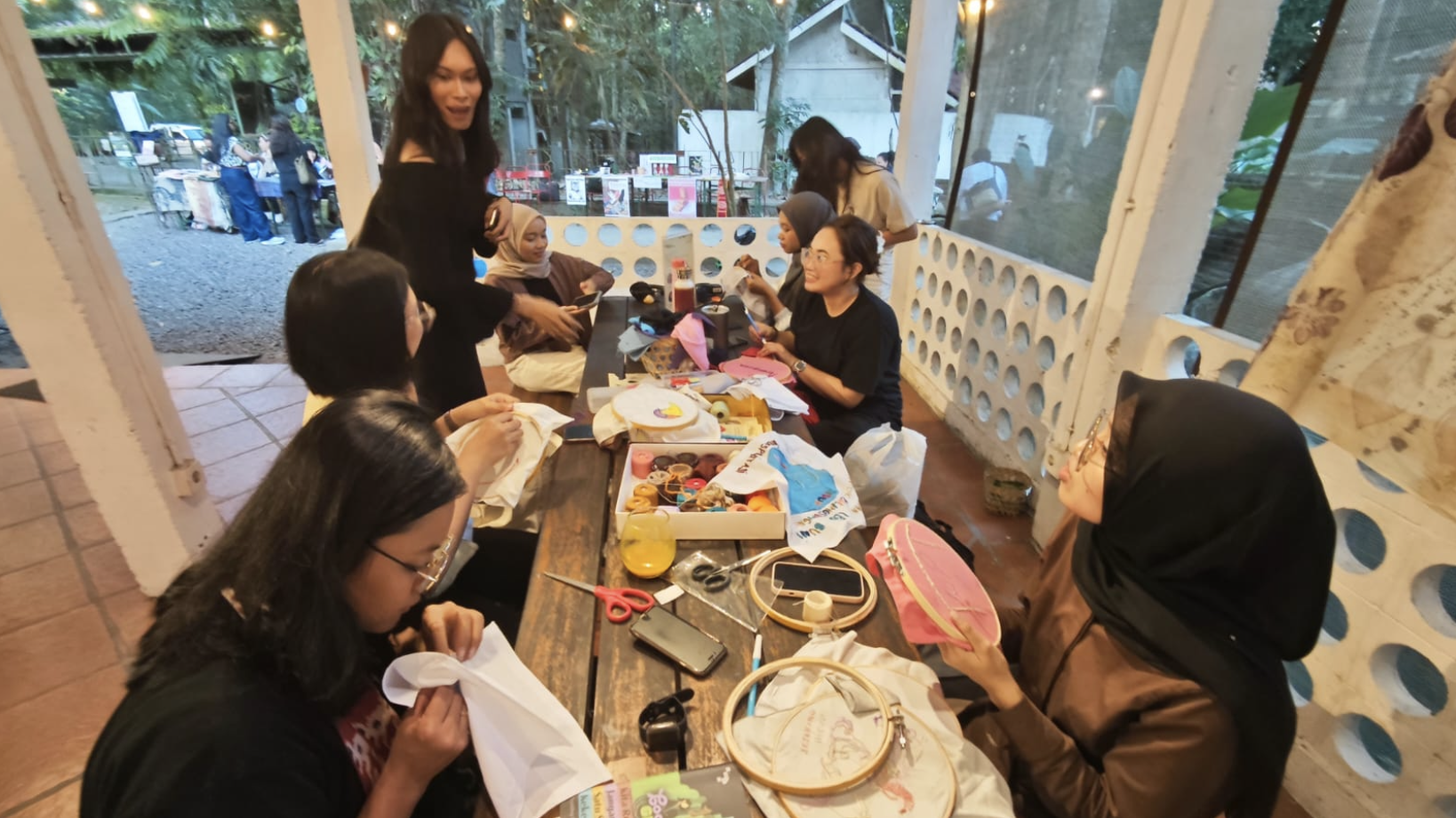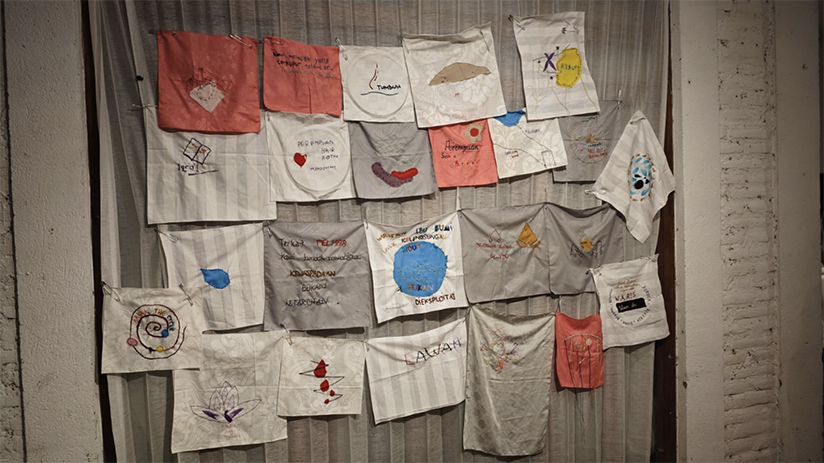

Lusiana Limono is an artist and textile crafter with a strong interest in environmental issues and handmade traditions. She aims to use craft as a language of expression in her works and knowledge production processes. Being an MA graduate from IKJ Postgraduates, she is interested in the role that cloth and domestic objects play in creating opportunities for a deeper connection between people and their sense of (place, wellbeing, identity, roots). She looks to the tradition of both textile crafting and the wearable goods to create (assemblage, installation, and objects), exploring intersections of labor, mindfulness, and culture.
She is currently a creative director at KAIT Handmade Studio, an explorative textile studio. She is the co-founder of MaPaQuilts and Kriya Kontemporer Indonesia. MaPaQuilts is a Malang-based community that gathers women quilters. Kriya Kontemporer Indonesia is a craft forum for craft scholars, practitioners, and professionals. Lusiana is closely affiliated with peretas.id and Sekolah Pemikiran Perempuan. Both are independent initiatives for women art workers in Indonesia and beyond.
She has been awarded the Good Design Indonesia-Best (2017), the Good Design Award in Japan (2018), the ASEAN Foundation Weaving Tales Award (2021), and a dance film, Kait (2022), was nominated for the IMAJITARI 2023 official selection. Her recent solo exhibition, Berbicara Melalui Kain (2023), was presented by Goethe-Institut Indonesien at Goethehaus Foyer Jakarta.

The climate crisis has emerged as a global concern, demanding immediate actions from all parties. Among the leading culprits behind the temperature surge lies in industrialisation, coupled with the intricate web of capitalism. These patterns have fostered a culture of excessive consumption and irresponsible production, with the textile industry serving as a prime example. Alas, its remnants have transformed into one of the most formidable pollutants we face today. Textile craft as old practices of making garments holds profound significance in our lives. Women workers have long played a pivotal role in textile and garment factories, while home-based artisan have traditionally dominated the craft of textile production. By scrutinising domestic textile craft, I have embarked on a journey to challenge conventional thinking surrounding the climate crisis.
Contrasting the rampant consumerism and fleeting trends of fast fashion, I advocate for a return to slow-made, handcrafted creations that are intuitive, therapeutic, and more attuned to our shared humanity. In doing so, we unveil our remarkable capacity to assert our clothing, food, and shelter sovereignty, I draw inspiration from the natural accumulation of the colonial record, with a particular focus on spices. These aromatic treasures, which were once the archipelago's primary renewable commodities have deep-rooted connections to women's activities within the home and kitchen. It is within this convergence of material, women, and the domestic space that the genesis of my works takes form.
This project will explore materials found around the area (site-specific materials) such as fiber, packaging waste, etc. The execution will use simple tools and domestic textile technique to create works about “home”. Home as domestic space is a site of struggle for knowledge production that leads to the formation of culture. Home is not just a house, but a living space. It’s not just a space but also feeling. The objective is to raise awareness of The Earth as a home that is threatened by the climate crisis related to our production and consumption patterns. Using old practices and novel approaches to materials, shaping new ideas with an eye to the future.
Home crafts and home cooking are deeply attached to knowledge from a women's lived experiences, such as fishing nets for Orang Laut, spices for cook seasoning, health drinks and colouring. The physical and daily function inherent in craft make them seem shallow and banal, often undervalued as cultural products and knowledge. We need to dismantle existing perspectives towards the medium, decolonizing knowledge embedded in women and domestic craft. This encompasses the practices of rural communities steeped in tradition, urban dwellers, and contemporary craft activists alike. It needs to be revealed, in its relation to the past, present, and future cultural distributions.
- Convey past knowledge and relevance to current and future times: Weekly spice camphor workshops for guests and staffs
- Inviting urban communities on Bintan to jointly reflect on responsible consumption of cultural products, arts, and knowledge: crochet workshops using local materials for domestic needs such as coaster and table mat for local communities



.jpeg)




.jpeg)





.jpeg)
.jpeg)
.jpeg)

.jpeg)








During my residency, I researched plants for natural dyes and aromatic spice plants. In the first week of my stay in Nikoi, with the help of Pak Yogi, I discovered 12 aromatic plants that are also used as spices in the kitchen. Some of these plants are deliberately planted by employees for cooking needs on the island, and some also grow wild. This plant has a distinctive aroma and has the qualities to be used as a natural camphor repellent for moths, mosquitoes, ants and flies. For natural dyes, I found several plants that can be used for natural dyes, such as ketapang leaves (sea almond leaves), rosella flowers, papaya leaves, and hibiscus. However, natural dyeing requires a long process and the use of fire for cooking. Safety restrictions on using fire at the studio space and limited residency time have made me determine priorities in my work. I decided to focus on the main projects and workshops, not to focus on various natural dyeing this time. I used natural dye only using dry ketapang leaves in a cold process. I used the results of dyeing used bed sheets with dried ketapang leaves to make bags for the natural camphor workshop.
My main residency project was reconstructing the Swarovski crystal fishing nets handmade by the Orang Suku Laut women 10 years ago into a new work of art.
I learned that Swarovski has collaborated with The Island Foundation charity and designer Victoria Lodder to present an exhibition celebrating the Orang Suku Laut, or "People of the Sea," a historically nomadic community from the Riau Archipelago. The exhibition, which features archival and contemporary photos documenting the community’s life and artworks inspired by their experiences, was held at the National Museum of Singapore in 2015. A centrepiece of the exhibition, the Swarovski Crystal Fishing Net, was intricately woven over eighteen months by the late Ibu Satna, wife of the village chief, in Panglong Village, Bintan, with the guidance of jewelry designer Victoria Lodder. Swarovski’s partnership with The Island Foundation began in 2012, supporting the Orang Suku Laut’s women with donated crystals to craft jewelry. This Crystal Net was commissioned to honour and preserve the Orang Suku Laut’s traditional craft skills, passed down through generations, while symbolising the community’s shift from sea to land as they explore opportunities in tourism. Since 2011, The Island Foundation has worked with Panglong to help develop essential land-based skills for the 21st century and to provide sustainable solutions for clean water access.
When I first received the crystal fishing net, there was a large hole in the net due to wear and tear. To understand how to best approach the reconstructing of the fishing net, I made arrangements to meet and interview Tintin, the chief of the Orang Suku Laut, in the second week. Observations of nature and local history guided me to re-stitch and weave these crystals to resemble coral. Coral is a marker of marine ecosystems in the form of Nikoi Island, and a symbol of home for change.
Exploration of weaving and shape is carried out intuitively. Without sketches and designs, my creation process flowed through the senses and is expressed in the material through finger touches and visual sensations. The finest stainless steel wire that is usually used for fishing becomes sewing thread as a line element—lines of wire thread sewn into shape. The transparent colour of the crystal plays with the reflection of light (natural or artificial light) to produce an ever-changing visual effect, the 3-dimensional texture when touched will give a sound effect. Visual elements, sounds and shapes also guide the Orang Suku Laut when sailing. They read nature through visuals of stars at night, wind blowing, ocean currents, and the sound of coral. I want to present this knowledge about the connection between nature and the senses in the re-embodiment of this crystal work. I titled this work ANYAM NIKOI, which means “Weaving/Stitching Nikoi”, as a symbol of change and civilisation.







